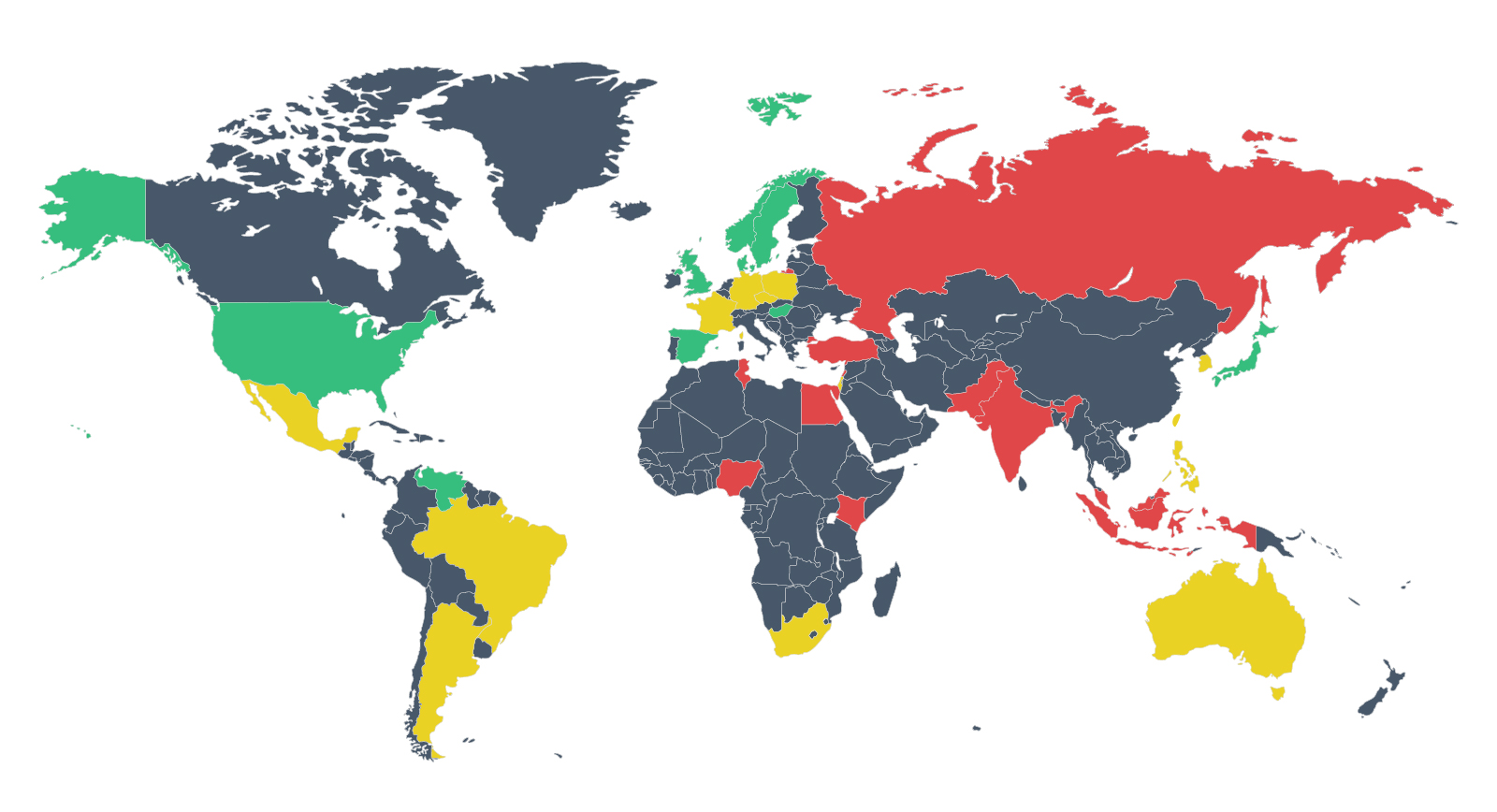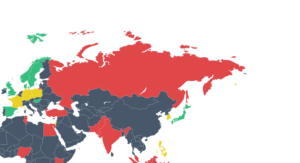
For immediate release: A new survey reveals that most people and nations strongly support free speech in principle but have reservations in practice.
A global survey “Who Cares about Free Speech?” has been conducted by YouGov for the legal think tank Justitia, which asks citizens in 33 countries questions about their attitude towards free speech in principle and testing their attitude when confronted with controversial speech and trade-offs.
Support for the principle of free speech is very high, averaging around 90 percent in all countries, but it drops substantially when put to the test against supposedly competing values such as statements offensive to religion and minority groups or statements disclosing information that could destabilize the national economy.
To assess the actual support for free speech in a country, the survey includes a composite measure, the Justitia Free Speech Index, based on answers to eight “tough” questions. The top scorer is Norway with 80 points average approval on all eight questions while Pakistan is at the bottom with only 38 points.
JUSTITIA FREE SPEECH INDEX
Explore the mapThe findings in “Who Cares about Free Speech?” indicate that Scandinavians and Americans are most supportive of free speech while citizens in Latin America, other parts of Europe, Australia, Israel, and the East Asian democracies (Japan, South Korea, and Taiwan) also show relatively strong support. Meanwhile, support for free speech is weaker in Russia, Turkey, other parts of Asia, and Africa. Egypt, Kenya, Pakistan, Malaysia, and Tunisia receive the lowest scores on the Justitia Free Speech index.
Jacob Mchangama, director of the legal think tank Justitia, says of the findings:
“The survey is a stark reminder that, even though the principle of free speech is very widely accepted, we’ve yet to develop a truly robust culture of free speech at the global level. Even nations with very strong free speech traditions such as the Scandinavian countries and the United States enjoy far from universal support for controversial speech.
Given that free speech is essential for democracy, freedom, and human flourishing, it is encouraging that more than 90 percent of the global population supports free speech in principle. But once people are forced to measure their support of the value of free speech in the abstract against trade-offs and supposedly competing values, the near universal support plummets, and big differences in attitudes emerge.
These differences have very real consequences since they drive and legitimize the suppression of political dissent and the persecution of religious and sexual minorities and help consolidate the global development towards increasing authoritarianism. In an increasingly digital world in which global platforms cater to billions of people, the tolerance gap also risks fueling a race to the bottom in which the lowest common denominator becomes the bar for permissible speech as policed by unaccountable private tech companies with little transparency.
Unless we develop a more tolerant attitude towards ideas that clash with deeply-held values, there is a risk that the ongoing free speech recession, which has affected the right to speak truth to power in authoritarian states, liberal democracies, and private social media platforms, will only be perpetuated. As George Orwell so succinctly put it, if free speech means anything, it is the right to tell people what they do not want to hear.”
The survey has been conducted by YouGov in February 2021. It is part of the Future of Free Speech project, which is a collaboration between Copenhagen based judicial think tank Justitia, Columbia University’s Global Freedom of Expression and two academic experts, Svend-Erik Skaaning and Suthan Krishnarajan, from Aarhus University.
Jacob Mchangama is available for comment at jacob@justitia-int.org and +45 24 66 42 20
Major findings from the report:
1) Support for free speech varies greatly across the globe. Among the 33 countries surveyed, Scandinavians and Americans are most supportive of free speech while Russians, Muslim-majority nations, and the least socio-economically developed nations express the lowest levels of support.
2) In Egypt, Hungary, the Philippines, Russia, Turkey, and Venezuela, the actual level of freedom of expression is very low compared to the popular demand for free speech in those countries.
3) Support for free speech is generally expressed by large majorities in all countries when people are asked their opinion.
4) However, when confronted with controversial statements – e.g., statements offensive to minorities or religions or supportive of homosexual relationships, or insults to the national flag, the support is generally lower and varies much more between countries and across issues and individuals. Likewise, variation between countries increases and the rankings are different when people are confronted with potential trade-offs regarding information that might be sensitive to national security, harm economic stability, or undermine the handling of epidemics.
5) General support for free speech has not decreased since 2015. Most nations demonstrate stable or even increased levels of support. However, there are exceptions. Most notably, acceptance of unrestricted criticism of the government has declined in the US.
6) Various background conditions in the form of gender, age, education, and placement on the left-right political spectrum are related to support for free speech in different ways in different countries. There are some general tendencies, however, including a higher tolerance among left-leaning individuals for insults to national symbols and more acceptance among right-leaning individuals of statements offending minority groups – particularly, in Western countries.
7) In the US, young people, women, the less educated, and Biden voters are generally less supportive of free speech.
8) In many countries, people have a tendency to understate tolerance of statements that criticize their own religion and beliefs. Meanwhile, many citizens have a tendency to exaggerate how important they consider the right to criticize their governments.
9) In all the countries surveyed, a majority prefers some kind of regulation of social media content. However, only a few want the government to take sole responsibility for this. People in two-thirds of the countries surveyed prefer such regulation to be carried out solely by the social media companies themselves while a plurality in the rest prefer the regulation of content to be carried out by the social media companies along with the national governments.
10) Opinions about regulation of social media content are sensitive to whether the issue is linked to statements about fake news or repression of free speech.
Report Materials



